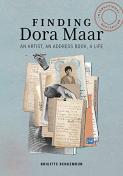BKMT READING GUIDES
Finding Dora Maar: An Artist, an Address Book, a Life
by Benkemoun Brigitte
Paperback : 216 pages
1 club reading this now
0 members have read this book
Introduction
In search of a replacement for his lost Hermès agenda, Brigitte Benkemoun’s husband buys a vintage diary on eBay. When it arrives, she opens it and finds inside private notes dating back to 1951—twenty pages of phone numbers and addresses for Balthus, Brassaï, André Breton, Jean Cocteau, Paul Éluard, Leonor Fini, Jacqueline Lamba, and other artistic luminaries of the European avant-garde. After realizing that the address book belonged to Dora Maar—Picasso’s famous “Weeping Woman” and a brilliant artist in her own right—Benkemoun embarks on a two-year voyage of discovery to learn more about this provocative, passionate, and enigmatic woman, and the role that each of these figures played in her life.
Editorial Review
No Editorial Review Currently AvailableExcerpt
Found ObjectIt arrived in the mail, carefully packed in bubble wrap. Same trade- mark, same size, same smooth leather, but redder, softer, with a well-used sheen.
He’ll like this, I thought, maybe even better.
He had just lost a small Herme?s diary, newer than this one, but somehow ageless from constantly sliding in and out of pockets. Engraved with his initials, T.D., it was a kind of talisman to which he’d been attached, practically, physically, sensually. ...
Discussion Questions
1. Picasso said, “First I find, then I seek.” The author has used this quote as one of the epi- graphs for her book. Have you ever found (or acquired secondhand) an object and tried to uncover its history, either through research or imagining who might have owned it? Is there an object in your life that holds a great deal of personal meaning?2. Dora Maar wrote, “My destiny is magnificent whatever it seems. In the past I used to say my destiny is very hard whatever it seems.” What do you think she meant by this? How have your thoughts about your own future changed over time? What does the concept of destiny mean to you? Do you think this author, a journalist with an interest in art, was destined to find this address book and learn its story?
3. How do you think the theme of obsession plays a role in this story—for the author, for Dora Maar, or for other people in Dora’s life?
5. If someone found your address book—or perhaps today’s equivalent, the contact list in your cell phone—do you think they could use it to discover who you were and what rela- tionships you had? How do you think that process would be complicated, or simplified, by the digital tools we use today?
6. Dora Maar seems to have undergone a transformation from her student days as a leftist, anti-fascist revolutionary to her later years as a religious conservative. Do you think it is possible to have a complete reversal of beliefs from one period in your life to another? What kind of event or experience might cause that to happen?
7. The author suggests that Dora Maar may have learned to be anti-Semitic from her father. Does this imply that we can’t escape becoming like our parents? Why do you think Dora kept a copy of Adolf Hitler’s Mein Kampf?
8. Dora Maar is widely known through Picasso’s representations of her as the “Weeping Woman.” Do the author’s theories about who Dora was and what happened in her life line up with the image of the Weeping Woman? Why or why not?
9. Why do you think Dora Maar wanted to be known as a painter rather than a photographer?
10. What do you think of the author’s insertion of herself and her personal history into this
story? Why do you think she does this? Does it improve or take away from the story?
11. Dora Maar’s real name was Henriette Theodora Markovitch. She chose the name Maar for herself. The author explains that Maar is a German word that means crater and has a relationship with fire and fusion. Why do you think Dora chose this name?
12. How would you classify this book? Biography? Memoir?
Cultural history? Fiction? A combination of these genres? The author often imagines what Dora Maar and her friends might have said or thought based on facts she learns about them. Do these imagined con- versations enhance or complicate the credibility of the story?
Book Club Recommendations
Recommended to book clubs by 0 of 0 members.
Book Club HQ to over 90,000+ book clubs and ready to welcome yours.
Get free weekly updates on top club picks, book giveaways, author events and more








